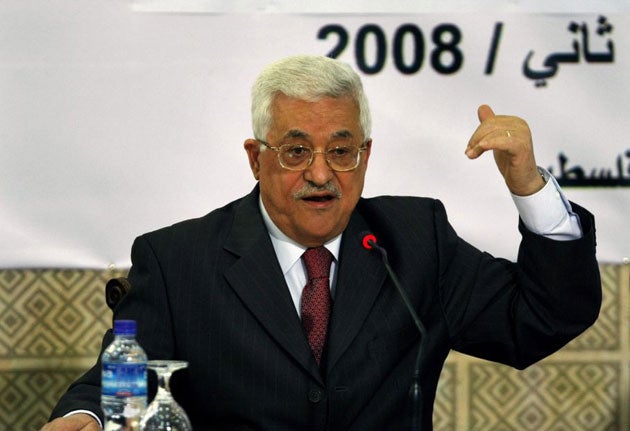We talk or go to polls, Abbas tells Hamas
Miliband to push for 2002 Arab peace plan to be basis of Middle East settlement

The Palestinian President, Mahmoud Abbas, who is facing a growing challenge from Hamas to the legitimacy of his rule, threatened yesterday to call elections unless the Islamic militant group agreed to a reconciliation with his Fatah movement.
Hamas, which staged an armed takeover of Gaza in June 2007, and Fatah, which controls the West Bank, were to hold talks earlier this month in Cairo to try to resolve their differences. But Hamas decided not to take part, citing continued arrests of its followers by Mr Abbas's security forces.
"We are determined that there be a continuation of the dialogue and will make every effort for it to succeed but if not, there will be a presidential decree at the onset of next year for simultaneous presidential and legislative elections," Mr Abbas, pictured below, told a meeting of Palestine Liberation Organisation (PLO) committee members.
He did not set a date for a possible poll but said that any decree would call for elections to be held according to a system of "total proportional representation", which would do away with the district contests that contributed to Hamas's shock victory in the 2006 legislative elections. Hamas rejected Mr Abbas's proposal, a stance which in effect makes it impossible for balloting to be held in Gaza.
Hani al-Masri, the director of the Alternatives think-tank in Ramallah, said that a new poll could make the Fatah-Hamas rivalry more bitter.
"If elections are held without Hamas's agreement, we could end up with Fatah holding its own elections in the West Bank and Hamas holding its own elections in Gaza. Then the Palestinian division will reach the point of no return." The ensuing legitimacy crisis could deteriorate to the point of "assassinations and bombings", he said.
There are also doubts about whether Israel, which controls movement in the West Bank, would agree to polling.
Hamas has been boosted in its rivalry with Fatah by the impasse in Mr Abbas's peace talks with Israel and the election of Barack Obama – Palestinian analysts believe that he will be less hawkish towards Hamas's Syrian and Iranian allies than George Bush.
Mr Abbas has failed to carry out reforms and empower young grass-root Fatah leaders to replace his older generation PLO associates, so there is no guarantee he would defeat Hamas.
Hamas is insisting that Mr Abbas has no right to call elections or continue in office beyond January next year, four years after he won a presidential election. "His term ends on 9 January and he should go," said the Hamas spokesman Fawzi Barhoum.
Mr Barhoum says that after that date, the legitimate president will be Ahmad Bahar, the Hamas deputy speaker of parliament from Gaza.
According to the constitution, power is transferred from the President to the speaker, but the current speaker, Aziz Dweik, is in prison in Israel.
The British Foreign Secretary, David Miliband, will today urge consideration of the 2002 Arab peace plan as the basis for a Middle East settlement. He will argue that it is the most promising way to ensure reconciliation between the warring Palestinian factions. In a speech in Abu Dhabi signalling a policy shift, Mr Miliband will conclude that the US-backed Annapolis process towards a two-state solution is dead.
Next year – with Barack Obamain the White House – will be important for the Middle East “because… the international community’s efforts are not succeeding”.
“In Israel, senior figures… are talking about the Arab Peace Initiative – not as a take-it-or-leave-it detailed agreement but as a concept of land for security that only normalisation can make real.” The 2002 proposal is gaining traction after Mr Abbas at the weekend urged Mr Obama to adopt the Arab initiative – calling for an Israeli withdrawal to 1967 borders – immediately on taking office. “I am convinced such a peace is our best if not our only hope,” Mr Miliband will say.
Join our commenting forum
Join thought-provoking conversations, follow other Independent readers and see their replies
Comments
Bookmark popover
Removed from bookmarks